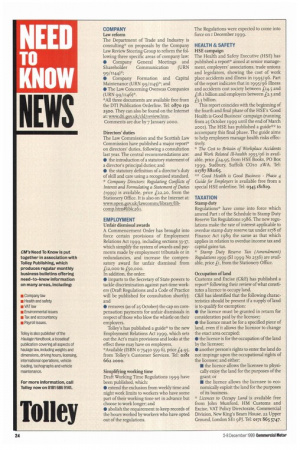NEVIS
Page 26

If you've noticed an error in this article please click here to report it so we can fix it.
CM's Need To Know is put together in association with Miley Publishing, which produces regular monthly business bulletins offering need-to-know information on many areas, including:
• Company law • Health and safety • VAT law • Environmental issues • Tax and accountancy • Payroll issues.
Tolley is also publisher of the Haulage Handbook, a looseleaf publication covering all aspects of haulage law, including weights and dimensions, driving hours, licensing, international operations, vehicle loading, tachographs and vehicle maintenance.
For more information, call Tolley now on 0181 686 9141. COMPANY
Law reform The Department of Trade and Industry is consulting* on proposals by the Company Law Review Steering Group to reform the following three specific areas of company law: • Company General Meetings and Shareholder Communication (URN 99/1144)*; • Company Formation and Capital Maintenance (URN 99/1145)*; and • The Law Concerning Overseas Companies (URN 99/114.6)*.
*All three documents are available free from the DTI Publication Orderline. Tel: 0870 150 2500. They can also be found on the Internet at: www.dti.gov.uk/c1d/review.htm. Comments are due by 7 January 2000.
Directors' duties
The Law Commission and the Scottish Law Commission have published a major report* on directors' duties, following a consultation last year. The central recommendations are:
• the introduction of a statutory statement of a director's principal duties; and
• the statutory definition of a director's duty of skill and care using a recognised standard. * Company Directors: Regulating Conflicts of Interest and Formulating a Statement of Duties (1999) is available, price £22.20, from the Stationery Office. It is also on the Internet at: www.open.gov.uk/lawcommilibrary/libcomp.htm#liblc261.
EMPLOYMENT
Unfair dismissal awards
A Commencement Order has brought into force certain provisions of Employment Relations Act 1999, including SWIMS 33-37, which simplify the system of awards and payments made by employment tribunals or in redundancies, and increase the compensatory award for unfair dismissal from LI2,000 to £50,000.
In addition, the order:
• imparts to the Secretary of State powers to tackle discrimination against part-time workers (Draft Regulations and a Code of Practice will be published for consultation shortly); and • removes (as of 25 October) the cap on compensation payments for unfair dismissals in respect of those who blow the whistle on their employers.
Tolley's has published a guide* to the new Employment Relations Act 1999, which sets out the Act's main provisions and looks at the effect these may have on employers.
*Available (ISBN o 7545o 559 6), price 14.95, from Tolley's Customer Services. Tel: or81 662 2000.
Simplifying working time Draft Working Time Regulations 19 99 have been published, which: • extend the exclusion from weekly time and night work limits to workers who have some part of their working time set in advance but choose to work longer; and • abolish the requirement to keep records of the hours worked by workers who have opted out of the regulations.
The Regulations were expected to come into force On I December 1999.
HEALTH & SAFETY
HSE campaign The Health and Safety Executive (HSE) has published a report* aimed at senior management, employers' associations, trade unions and legislators, showing the cost of work place accidents and illness in 1995/96. Part of the report indicates that in 1995196 illness and accidents cost society between £'4.s and 118.1 billion and employers between 12.3 and 15.3 billion.
This report coincides with the beginning of the fourth and final phase of the HSE's 'Good Health is Good Business' campaign (running from 25 October 1999 until the end of March 2oor). The HSE has published a guide"* to accompany this final phase. The guide aims to help employers manage health risks effectively.
* The Cost to Britain of Workplace Accidents and Work Related Ill-health 1995/96 is available, price 124.95, from HSE Books, PO Box 199 9, Sudbury, Suffolk COTo 2WA. Tel: 01787 881165.
** Good Health is Good Business Phase 4 Guide for Employers is available free from a special HSE orderline. Tel: o345 181819.
TAXATION
Stamp duty
Regulations* have come into force which amend Part I of the Schedule to Stamp Duty Reserve Tax Regulations 1986. The new regulations make the rate of interest applicable to overdue stamp duty reserve tax under s178 of Finance Act 1989 the same as that which applies in relation to overdue income tax and capital gains tax.
* Stamp Duty Reserve Tax (Amendment) Regulations 1999 (SI 1999 No 2536) are available, price 1'. from the Stationery Office.
Occupation of land Customs and Excise (C&E) has published a report* following their review of what constitutes a licence to occupy land.
C8E.E has identified that the following characteristics should be present if a supply of land is to qualify for exemption;
• the licence must be granted in return for consideration paid by the licensee;
• the licence must be for a specified piece of land, even if it allows the licensor to change the exact area occupied; • the licence is for the occupation of the land by the licensee; • another person's rights to enter the land do not impinge upon the occupational rights of the licensee; and either: • the licence allows the licensee to physically enjoy the land for the purposes of the grant; or • the licence allows the licensee to economically exploit the land for the purposes of its business.
* Licences to Occupy Land is available free from John Munford, HM Customs and Excise, VAT Policy Directorate, Commercial Division, New King's Beam House, 22 Upper Ground, London SET 9Pj. Tel: 0171 865 5747.








































































































